
Augie March are an Australian pop and indie rock band, which formed in 1996 in Shepparton, Victoria. Since 2001 the group consists of vocalist and rhythm guitarist Glenn Richards, lead guitarist Adam Donovan, bass guitarist Edmondo Ammendola, drummer David Williams, and keyboardist Kiernan Box. Box had replaced Robert Dawson, the band's piano player since March 2000, who died in January 2001.

Vulture Street is the fifth studio album by Australian alternative rock band by Powderfinger, released on 29 July 2003 by Universal Music. It won the 2003 ARIA Music Award for Best Rock Album. Produced by Nick DiDia, Vulture Street was certified platinum, and spent 47 weeks on the ARIA Charts and peaked at #1. Singles from the album included "(Baby I've Got You) On My Mind", "Since You've Been Gone", "Love Your Way" and "Sunsets".

The Drones were an Australian rock band, formed in Perth by mainstay lead vocalist and guitarist Gareth Liddiard in 1997. Fiona Kitschin, his domestic partner, joined on bass guitar and vocals in 2002. Other long-term members include Rui Pereira on bass guitar and then lead guitar; Mike Noga on drums, vocals, harmonica and percussion; and Dan Luscombe on lead guitar, vocals and keyboards. Their second album, Wait Long by the River and the Bodies of Your Enemies Will Float By, won the inaugural Australian Music Prize. In October 2010 their third studio album, Gala Mill was listed at No. 21 in the book, 100 Best Australian Albums. Two of their albums have reached the top 20 on the ARIA Albums Chart, I See Seaweed and Feelin Kinda Free. The group went on hiatus in December 2016 with Kitschin and Liddiard forming a new group, Tropical Fuck Storm, in the following year.
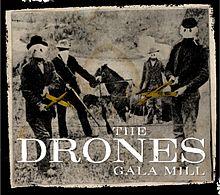
Gala Mill is the third studio album by Australian band the Drones, which was released in September 2006. Recorded in an abandoned mill in Tasmania, it was their last album to feature founding member Rui Pereira and the first to feature Mike Noga on drums. The music, which makes "an epic leap beyond garage rock", adds influences from folk rock and contemporary folk music to their usual punk blues style. Gareth Liddiard's lyrics for the album are centered more on Australia's colonial and recent history, evident in tracks such as "Jezebel", "Words From The Executioner To Alexander Pearce" and "Sixteen Straws".

ATP Recordings is a British independent record label that was started in 2001 by London-based concert promoter Barry Hogan of Foundation/All Tomorrow's Parties. It was originally created to bring out a compilation cd (ATPRCD01) after the Tortoise-curated All Tomorrow's Parties event. First, everyone who attended the first festival was given a limited edition promotional sampler (PROATPFCD01), the packaging of which echoed the Factory Records style of Peter Saville. The full compilation followed later, and indeed a number of other ATP festivals would also receive the compilation treatment, the most recent being the 2006 Nightmare Before Christmas, for which ATPR and Plan B Magazine collaborated on a free cd given out to attendees.
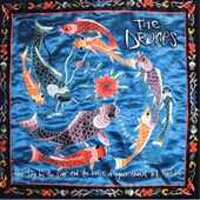
Wait Long by the River and the Bodies of Your Enemies Will Float By is the second album released by the Drones. Recorded "100% live", the album draws influence from the likes of Neil Young and Rowland S. Howard, though it has been described by lead singer/guitarist Gareth Liddiard himself as a punk rock album. The lyrics, penned by Liddiard deal with issues such as death, depression and alcoholism in its depiction of Australian working class life.

Gareth Liddiard is an Australian musician, best known as a founding member of both The Drones and Tropical Fuck Storm. Musically active since 1997, he has also released a solo album titled Strange Tourist in 2010. In 2021, Liddiard recorded and performed live with Jim White of the Dirty Three and Chris Abrahams of The Necks as Springtime.

The Miller's Daughter is a compilation album released by Perth band The Drones. The album compiles outtakes from the band's first two full-length releases and their first few non-album singles.

Here Come the Lies is the debut album released by Perth band The Drones.

"Shark Fin Blues" is a double A-side single taken from Australian rockers the Drones' second studio album, Wait Long by the River and the Bodies of Your Enemies Will Float By. The single was released on 25 September 2006. It also appeared as a limited edition, 7" picture disc, together with the band's fourth album, Gala Mill.
Robert Francis Cranny is a musician, songwriter and record producer based in Sydney, Australia.

Donald Hugh Walker is an Australian musician and songwriter who wrote many of the hits for Australian pub rock band Cold Chisel. Walker is considered to be one of Australia's best songwriters. In 2012 he was inducted into the Australian Songwriter's Hall of Fame.
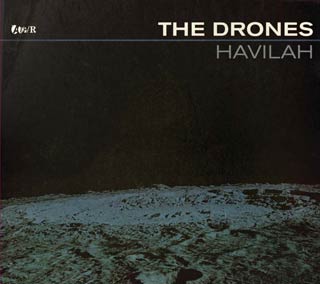
Havilah is the fourth studio album by Australian alternative rockers, the Drones, which was released by ATP Recordings/MGM Distribution in September 2008. It was co-produced by the group with Burke Reid and issued in February 2009 for the United Kingdom and United States markets. The title refers to a biblical town of the same name – "a Shangri-La-esque place with an abundance of gold" – and is the valley 20 kilometres (12 mi) from Myrtleford, where they recorded.

I See Seaweed is the fifth studio album by Australian band The Drones, released in March 2013. The album marked the first appearance of Steve Hesketh on keyboards and the last appearance of drummer Mike Noga. Recorded by the band themselves inside a "demountable classroom from the '60s", the music on the album is more dynamic, darker and "expansive" in comparison to previous albums, while Liddiard's poetic lyrics were regarded as being more "universal" and humorous in exploring topics such as climate change, free will, conservative politics, socioeconomic issues, existentialism and the human condition in general. The song "How to See Through Fog" was released as the album's only single in early 2013.

Feelin Kinda Free is the sixth studio album from Australian band The Drones, and their final one before going on hiatus. Having grown tired with the more rock-oriented sound of the band up until that point, frontman Gareth Liddiard became fascinated with both vintage and modern electronic equipment - ranging from drum machines and samplers to the Teenage Engineering OP-1 synthesizer - in conceiving the album's sound. Its genre-defying musical style has been described as visceral and ominous, featuring a relative absence of guitars and a prominent use of electronic textures. Its sessions also marked the first appearance of drummer Christian Strybosch since 2005's Wait Long by the River and the Bodies of Your Enemies Will Float By.
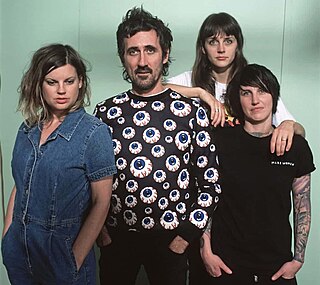
Tropical Fuck Storm are an Australian rock band from Melbourne, Victoria, formed by Gareth Liddiard and Fiona Kitschin from The Drones. Lauren Hammel, from the band High Tension, plays drums, and Erica Dunn, from the bands Mod Con, Harmony, and Palm Springs, plays guitars, keyboards, and other instruments. Their sound is characterised by elements of art punk, noise rock and experimental rock.
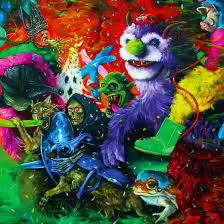
A Laughing Death in Meatspace is the debut album of Melbourne-based supergroup Tropical Fuck Storm, formed by members of The Drones, Palm Springs and High Tension. The band, wishing to step away from the more rock-centric sound that The Drones were known for prior to their final pre-hiatus album Feelin Kinda Free, utilized a range of obscure digital guitar effects, synthesizers, drum machines, and DAW software such as ProTools to create the music. Finished less than eight months after their first few live performances, the speed at which the album was recorded also had a heavy influence on its idiosyncratic sound, which combines genres such as punk blues, art punk, psychedelic rock and noise rock with influences from pop and electronic music. Written by Liddiard with contributions from other members, the lyrics have been described as apocalyptic and darkly humorous; tackling subjects such as technological advancement, political polarization, socioeconomic inequality, xenophobia, culture wars and many others. The album title links a Silicon Valley slang for the physical world with the neurodegenerative disorder of kuru found in the Fore people of Papua New Guinea.
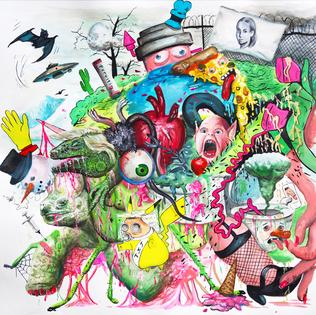
Braindrops is the second studio album by Australian supergroup Tropical Fuck Storm. It was released on 23 August 2019 through Flightless Records in Australia and Joyful Noise Recordings worldwide.

Deep States is the third studio album by Australian group Tropical Fuck Storm. It was released on 20 August 2021 through Joyful Noise Recordings. Recorded during the COVID-19 pandemic, the recording process for the album was unconventional and involved heavy experimentation. The music features a range of diverse influences and has been variously labelled as art rock, noise rock and psychedelic rock. Lyrically, the album deals with the social and emotional impact of the pandemic, with many songs also diving into subjects such as conspiracy theories, social media polarization, corruption, death and occasionally even feature science fiction themes.
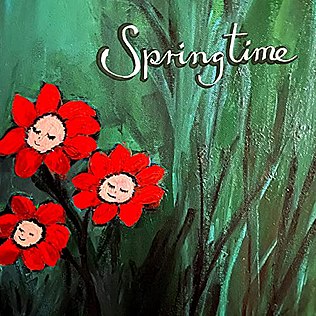
Springtime is the eponymous debut album from Australian supergroup Springtime, consisting of Gareth Liddiard, Chris Abrahams and Jim White. Recorded over 15 days at Liddiard's home studio in Nagambie, the largely-improvised album features lyrics from his uncle Ian Duhig, in addition to a Will Oldham cover and a reworking of a track by The Drones. It was released in Australia through TFS Records and in the US through Joyful Noise Recordings to largely positive reviews.




















